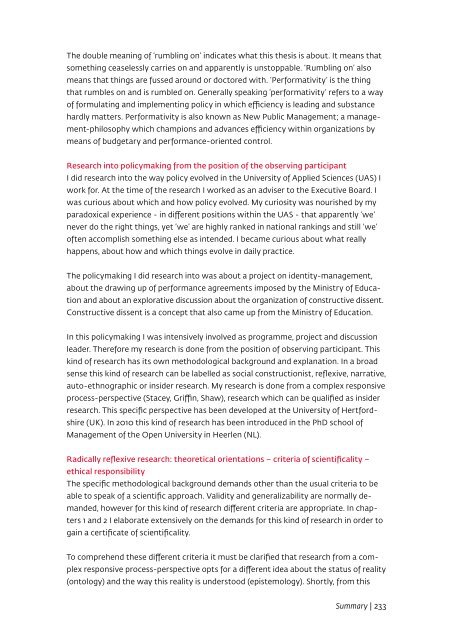Rumbling on performativity_Frits Simon
Rumbling on performativity_Frits Simon
Rumbling on performativity_Frits Simon
You also want an ePaper? Increase the reach of your titles
YUMPU automatically turns print PDFs into web optimized ePapers that Google loves.
The double meaning of ‘rumbling <strong>on</strong>’ indicates what this thesis is about. It means that<br />
something ceaselessly carries <strong>on</strong> and apparently is unstoppable. ‘<str<strong>on</strong>g>Rumbling</str<strong>on</strong>g> <strong>on</strong>’ also<br />
means that things are fussed around or doctored with. ‘Performativity’ is the thing<br />
that rumbles <strong>on</strong> and is rumbled <strong>on</strong>. Generally speaking ‘<strong>performativity</strong>’ refers to a way<br />
of formulating and implementing policy in which efficiency is leading and substance<br />
hardly matters. Performativity is also known as New Public Management; a management-philosophy<br />
which champi<strong>on</strong>s and advances efficiency within organizati<strong>on</strong>s by<br />
means of budgetary and performance-oriented c<strong>on</strong>trol.<br />
Research into policymaking from the positi<strong>on</strong> of the observing participant<br />
I did research into the way policy evolved in the University of Applied Sciences (UAS) I<br />
work for. At the time of the research I worked as an adviser to the Executive Board. I<br />
was curious about which and how policy evolved. My curiosity was nourished by my<br />
paradoxical experience - in different positi<strong>on</strong>s within the UAS - that apparently ‘we’<br />
never do the right things, yet ‘we’ are highly ranked in nati<strong>on</strong>al rankings and still ‘we’<br />
often accomplish something else as intended. I became curious about what really<br />
happens, about how and which things evolve in daily practice.<br />
The policymaking I did research into was about a project <strong>on</strong> identity-management,<br />
about the drawing up of performance agreements imposed by the Ministry of Educati<strong>on</strong><br />
and about an explorative discussi<strong>on</strong> about the organizati<strong>on</strong> of c<strong>on</strong>structive dissent.<br />
C<strong>on</strong>structive dissent is a c<strong>on</strong>cept that also came up from the Ministry of Educati<strong>on</strong>.<br />
In this policymaking I was intensively involved as programme, project and discussi<strong>on</strong><br />
leader. Therefore my research is d<strong>on</strong>e from the positi<strong>on</strong> of observing participant. This<br />
kind of research has its own methodological background and explanati<strong>on</strong>. In a broad<br />
sense this kind of research can be labelled as social c<strong>on</strong>structi<strong>on</strong>ist, reflexive, narrative,<br />
auto-ethnographic or insider research. My research is d<strong>on</strong>e from a complex resp<strong>on</strong>sive<br />
process-perspective (Stacey, Griffin, Shaw), research which can be qualified as insider<br />
research. This specific perspective has been developed at the University of Hertfordshire<br />
(UK). In 2010 this kind of research has been introduced in the PhD school of<br />
Management of the Open University in Heerlen (NL).<br />
Radically reflexive research: theoretical orientati<strong>on</strong>s – criteria of scientificality –<br />
ethical resp<strong>on</strong>sibility<br />
The specific methodological background demands other than the usual criteria to be<br />
able to speak of a scientific approach. Validity and generalizability are normally demanded,<br />
however for this kind of research different criteria are appropriate. In chapters<br />
1 and 2 I elaborate extensively <strong>on</strong> the demands for this kind of research in order to<br />
gain a certificate of scientificality.<br />
To comprehend these different criteria it must be clarified that research from a complex<br />
resp<strong>on</strong>sive process-perspective opts for a different idea about the status of reality<br />
(<strong>on</strong>tology) and the way this reality is understood (epistemology). Shortly, from this<br />
Summary | 233



